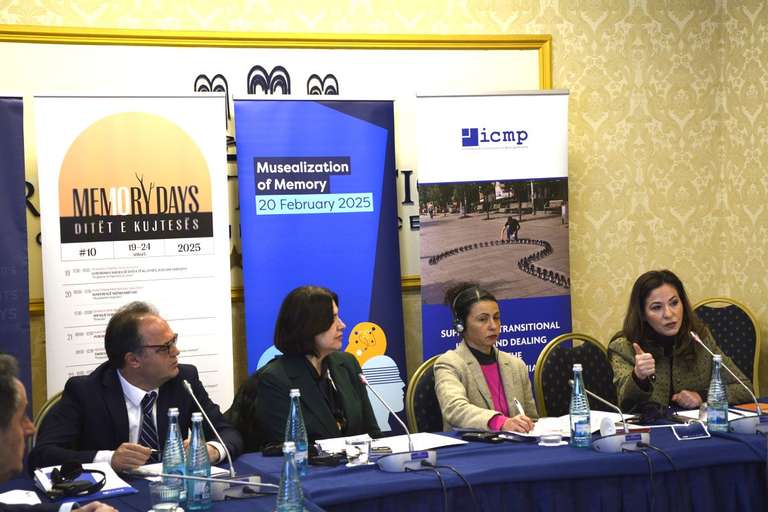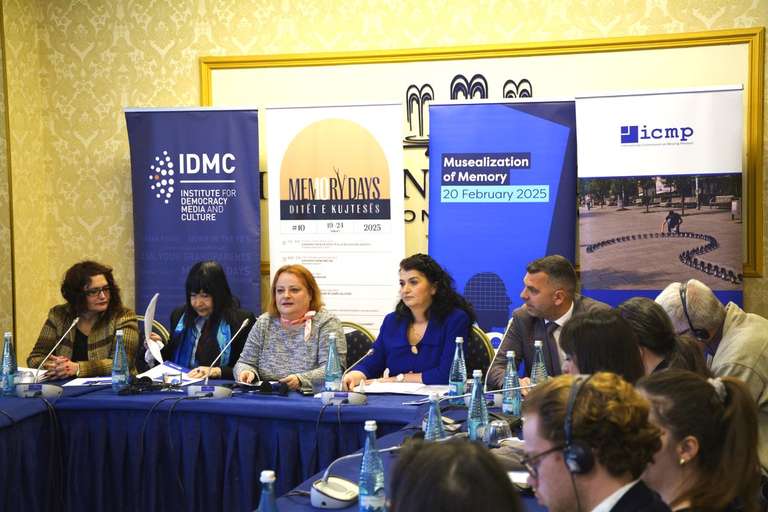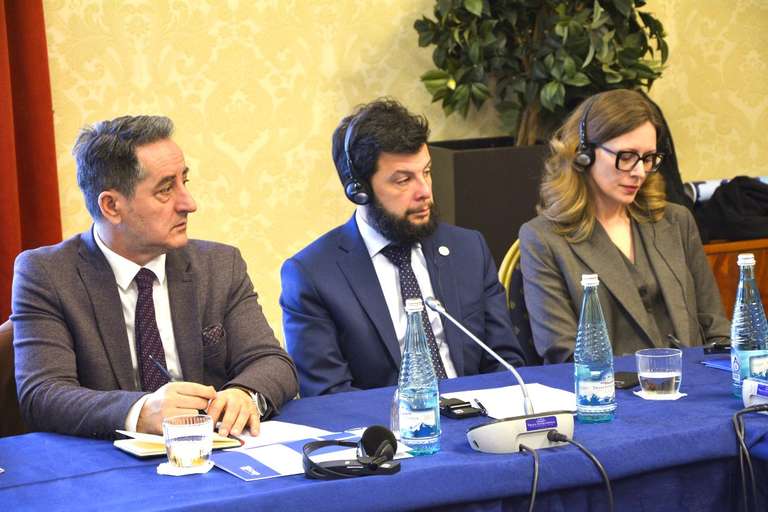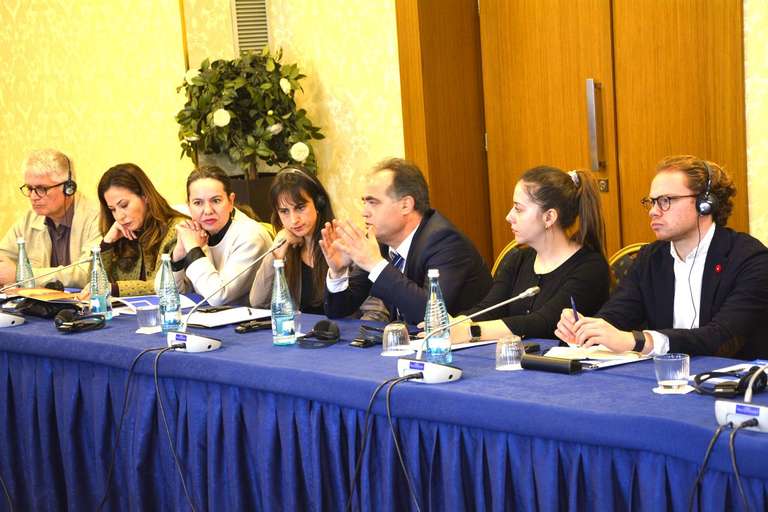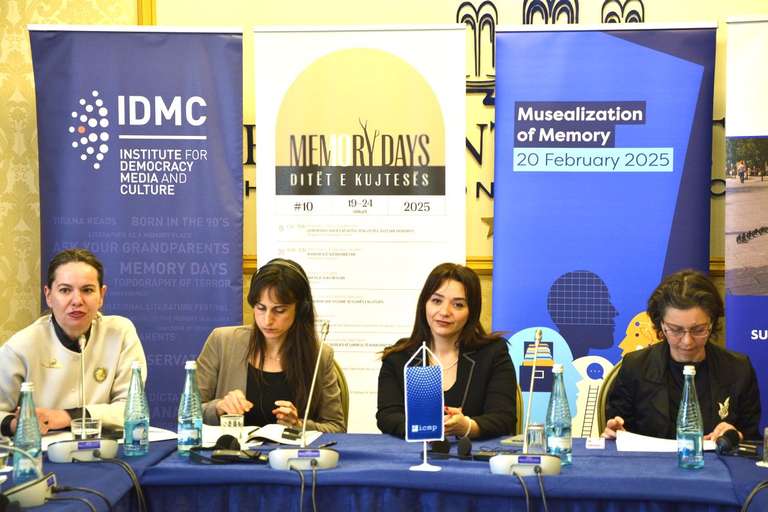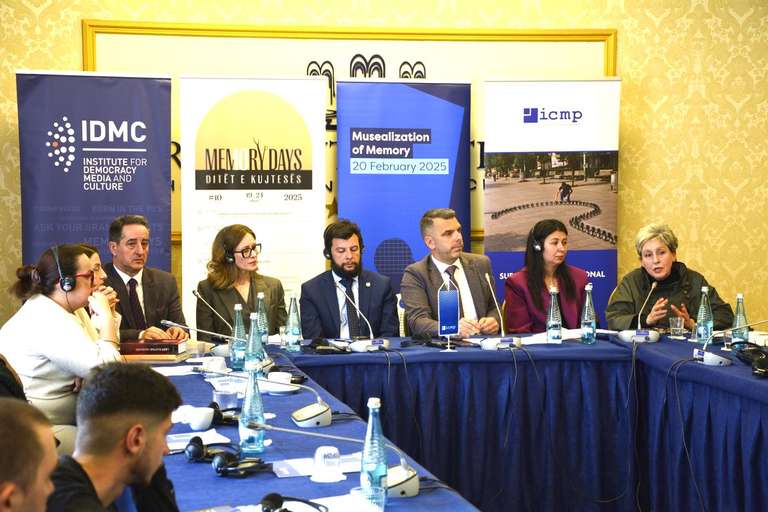International Conference “Musealization of Memory”

The International Conference “Musealization of Memory” was organized by the International Commission on Missing Persons (ICMP) and the Institute for Democracy, Media & Culture (IDMC) on February 20, 2025, at the Tirana International Hotel, as part of the 10th Edition of MEMORY DAYS. This event brought together key representatives of institutions dealing with the past, the EU Delegation to Albania, government representatives, museums and memorial sites, cultural heritage experts, researchers, policymakers, and civil society.
Luigj Ndou, Director of Government Relations for ICMP in Pristina and Tirana, emphasized the importance of preserving memory in transitional justice efforts, stating:
"Museums and memory sites play a vital role in safeguarding the truth about past injustices. By engaging communities in open and inclusive discussions, we can ensure that memory serves as a foundation for justice, social cohesion, and a shared commitment to never repeating past mistakes."
Frederique Hanotier, Political Officer for Human Rights, Democracy, and Media at the EU Delegation to Albania, stressed the necessity of addressing history transparently to ensure justice and strengthen the rule of law. She stated:
"The EU has consistently supported this process, recognizing its importance for Albania’s democratic consolidation. Museums play a vital role in keeping history alive within the collective memory, raising awareness about past atrocities, and preserving historical truth. This initiative provides Albania with a unique opportunity to learn from EU experiences. The EU remains fully committed to supporting Albania in these efforts, as transitional justice contributes not only to strengthening the rule of law but also to deepening ties between Albania and the EU. To commit to memory is to commit to justice and accountability—core European values that shape our shared future."
Jonila Godole, Executive Director of IDMC, highlighted concerns about the tendency to focus musealization efforts on sites and objects related to victims, neglecting places where they endured immense suffering. She stressed:
"This approach must change. Sites of repression, such as the internment camp in Tepelenë and the forced labor camp in Spaç—where remnants of forced labor are disappearing daily—must be preserved and transformed into museums and educational centers. Only by doing so can we ensure that future generations understand the realities of the past and that society remains committed to truth, justice, and memory."
Conference Panel Discussions
Musealization of Memory – Exchange and Lessons Learned from Existing Experiences
This session focused on current practices in memory preservation and musealization, identifying lessons learned and challenges faced by museums and memory sites in Albania.
- Pjerin Mirdita, Director of the “Site of Witness and Memory” Museum in Shkodër, emphasized the need for contributions and participation from individuals directly affected (victims or their relatives) to achieve the goal of preserving and conveying the past.
- Etleva Demollari, Director of the "House of Leaves" National Museum of Surveillance in Tirana, highlighted how the museum commemorates psychological violence and state control over citizens during the communist regime through exhibits of authentic surveillance equipment, secret documents, testimonies, and statistics. The museum fosters dialogue about the past, present, and future while raising awareness among younger generations about human rights and historical memory.
- Elenita Roshi, Director of the National Historical Museum of Albania, presented three monument construction projects aimed at preserving and interpreting historical and traumatic memory, emphasizing that both individual and collective memory are integral to cultural heritage and identity formation.
- Anila Zajmi, Specialist at the Directorate for Missing Persons under the Authority for Information on State Security Files, introduced projects designed to preserve historical memory and honor those who suffered under the communist regime. Among them:
- "Path of Freedom" in Kolonjë, a memorial dedicated to those killed or who fled attempting to cross the border during communism, incorporating symbolic and artistic elements inspired by Illyrian traditions.
- A memorial in Tirana, conceived as a resting and remembrance site for victims, with a monumental artistic approach integrating natural materials and functional elements for visitors.
- "Wall of Blood" in Shkodër, a symbolic memorial commemorating approximately 600 individuals executed during the communist era.
The panel, moderated by Sonila Danaj, Researcher at the European Centre for Social Welfare Policy and Research in Austria, underscored that the musealization of memory is essential for preserving and transmitting history. Engaging communities and fostering open dialogue are crucial for an inclusive and balanced representation of the past. Additionally, interactive technologies and educational approaches help bridge younger generations with history, reinforcing museums as centers of memory and education.
Dark Tourism
This session explored the benefits and challenges of dark tourism, its potential to transform mindsets, challenge assumptions, and counter prejudices, as well as future policy directions and institutional support for this type of tourism.
Benida Kraja, Director of Cultural Heritage Policies at the Ministry of Economy, Culture, and Innovation, highlighted efforts to protect and promote sites from the communist era as cultural heritage monuments, advocating for youth engagement in maintenance and revitalization initiatives.
Giulia Avanza, Program Director at the Santagata Foundation for the Economy of Culture, discussed her project on Spaç Prison, emphasizing the need for careful and respectful preservation of such tragic historical sites. She suggested establishing a cooperation network among museums and memory sites for regular experience-sharing and collaboration.
Admirina Peçi, from Bunk’Art Museums, explained the initial skepticism around Bunk’Art 1 and 2, now essential landmarks in Albania’s transitional memory landscape, attracting 400,000 visitors in 2024 alone. These museums also host artistic and historical events, including exhibitions, concerts, and documentaries.
Arjeta Kokalari, Director of the Musine Kokalari Museum in Gjirokastër, shared insights into her private initiative to establish a museum dedicated to the dissident Musine Kokalari. Despite its existence, the museum remains off the tourism map, with many authentic objects still awaiting certification and cataloging.
The panel, moderated by Edlira Agolli, an expert in Transitional Justice, emphasized that dark tourism in Albania is still in its early stages. Expanding the scope of dark tourism sites is essential not only for historical awareness and education but also for economic benefits and employment opportunities in local communities. Additionally, these institutions should serve as research hubs for young scholars and academics.
Alternative Models and Innovation
The final panel presented new approaches and initiatives for memory preservation, showcasing creative programs from Albania and the region that actively engage communities and strengthen social understanding. Panelists included:
- Merisa Topalović (Director) and Suada Nožić (Coordinator for Historical, Cultural, and Artistic Affairs) from the Museum of Crimes Against Humanity and Genocide, Bosnia & Herzegovina;
- Marina Maier, CEO of Austrian Service Abroad;
- Elsa Ballauri, Founder of the Women's Museum;
- Bekim Bllakaj (Executive Director) and Blerta Hoçia (Curator) from the Humanitarian Law Centre, Kosovo;
- Michal Keim, Director of the Department of Research and Education at the Institute of National Memory, Slovakia
The experts from the region presented their experiences and future projects. Their insights and perspectives were crucial for implementing these models in Albania, considering the extensive experience that some foreign countries have in this field. Some of the key points highlighted by the experts included:
- Museums as spaces for community engagement and interaction;
- Development of digital and virtual museums;
- Understanding collective memory through personal stories;
- Open-air museums and public space exhibitions;
- Enhancing social media and online platforms;
- Integration of art and artistic performances;
- Therapeutic and psychological care through museum experiences
The panel, moderated by Pjerin Mirdita, emphasized that musealization of memory is crucial for preserving and promoting historical identity, particularly in Albania's post-communist context.
A special thanks to all speakers, panelists, and participants, whose contributions and dedication are essential in advancing collaborative and sustainable approaches to historical memory preservation.

